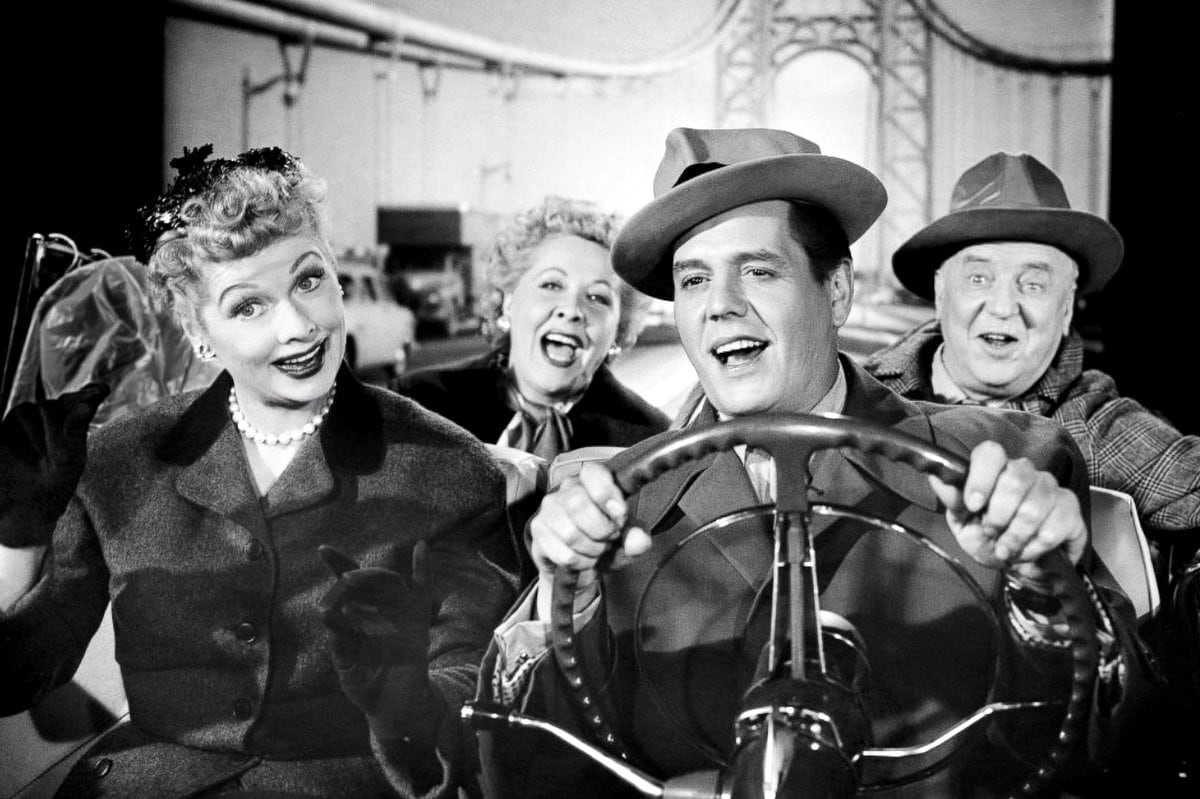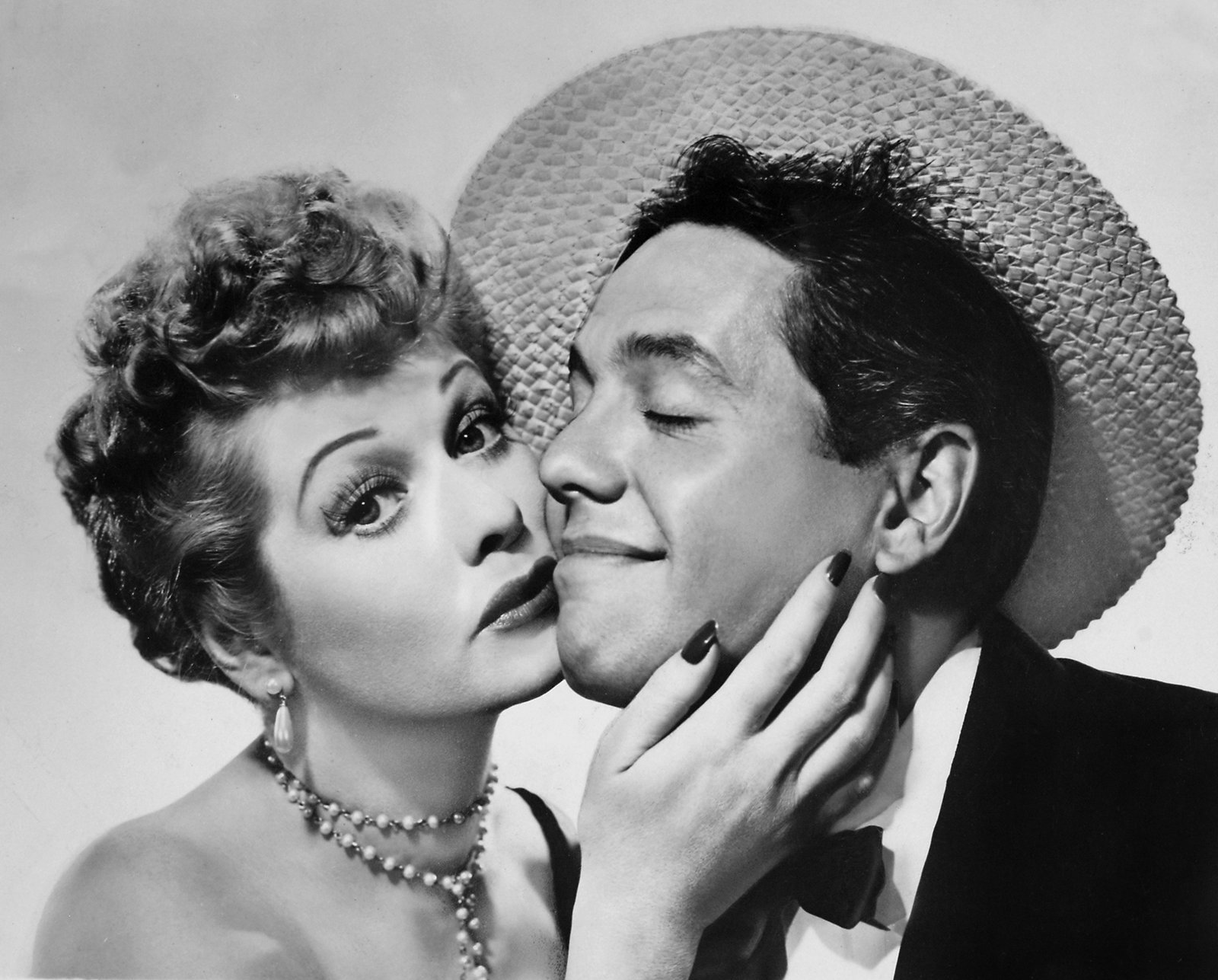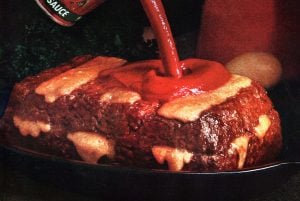We’d say his opinion didn’t age well, but honestly, he did make some good points that were perhaps a bit ahead of their time. And he clearly was a fan of Lucy herself. Overall, perhaps he took the show just a bit too seriously, though!
Below we have shared his view — which was probably one of the few negative ones! — as well as a 1977 retrospective from one of the show’s biggest all-time fans. Plus check out the theme song and opening credits!

I Love Lucy TV show theme song & opening credits (video)
Take a look back at the vintage 1950s television comedy show starring Lucille Ball and Desi Arnaz.

He Loves Lucy: TV Writer still watches the reruns (1977)
By Paul Jones – The Atlanta Constitution (Atlanta, Georgia) January 10, 1977
Everybody loves television’s I Love Lucy. But nobody loves her as much as Bart Andrews, one of Hollywood’s most prolific comedy writers.
Andrews started watching Lucy, starring Lucille Ball and Desi Arnaz (then husband and wife) when he was only 7. That was 25 years ago. He still watches reruns of I Love Lucy twice a day, five days a week. And he intends to continue viewing the reruns as long as they’re on TV.

“I get up in time to see the 9 a.m. showing, and I’m back before the TV set at 7 p.m., watching Lucy,” said Andrews, who has authored a book entitled “Lucy and Ricky and Fred and Ethel” (E.P. Dutton and Co).
“‘I Love Lucy’ was funny years ago, and it is just as funny today,” said Andrews, who has contributed some 150 scripts to almost every sit-com on TV, including the “Mary Tyler Moore Show” and “All in the Family.” “But there is no show on the air today which could last that long today. Their topicality dates them.”

Why did “I Love Lucy” make it so big?
“The secret of it all was the fact that Lucy had done a comedy show, ‘My Favorite Husband’ in radio. And when she and Desi conceived the idea of doing a TV series, she brought along with her all the people who were involved in her radio show. She brought along her producer Jess Oppenheimer and her gifted writers, Madelyn Pugh and Bob Carroll Jr.

“Combined, they provided the perfect meld of production and comedy talent. Lucille Ball was the supreme comedy actress. Desi was not all that good, but he eventually matured into a fine comedy actor.
“Lucille Ball is an actress who is capable of doing anything the script calls for. She is not a funny person. She is very serious — a perfectionist, who insisted that Harpo Marx rehearse a scene until 2 a.m.,” said Andrews.

“Desi, on the other hand, telegraphed all of his lines. Often, the camera would catch him reciting other actors’ lines. He eventually got better, and the assignment became an easy one.
In fact, as the years went on, and Desi became more enmeshed in the business affairs of Desilu (the couple’s company), the director, Phil Asher, who was once married to Elizabeth Montgomery, stood in for Desi until dress rehearsal. Then Desi would come and read once, and go on and do the episode before a live audience,” Andrews said.

“I Love Lucy” was a smash hit its first season, but everyone was concerned that it might be a flop after only five episodes had been filmed in the revolutionary three-camera technique.
“Everyone was saying to everyone else, ‘What can we do with this thing? How can we turn it around?’ The episodes lacked punch. They weren’t funny. But the series built slowly like The Waltons and All in the Family.
“The writing and acting got better. The scripts were more coherent. The show remained No. 1 for three years without being topped. The reruns — 169 episodes — still fantastic ratings.” he said.
ALSO SEE: Did married couples really sleep in separate beds back in the ’50s?

The supporting players — Frawley and Vivian Vance, who played Fred and Ethel Mertz, Lucy’s neighbors — provided the real magic for the show. But Frawley and Vance almost weren’t chosen for their parts.
Bea Benaderet was the first choice for the role of Ethel. And Gale Gordon, who later starred in The Lucy Show, was the favorite for the role of Fred. Gordon found himself bound by an old radio contract, and Miss Benaderet turned down the part.

“Bill Frawley heard about the part and phoned Desi. This led to conversations among sponsors and the network. Frawley was branded as a drunk,” said Andrews. “But Desi insisted on talking with him.
“The two went to the Brown Derby, and Desi was very frank. He told Bill that he had heard of his reputation for drinking and told him he would hire him, but if he failed even once to show up on time, he would be written out of the show. Frawley was never late — not even once — in the nine years the show was in production.”

MORE: We loved Lucy: ’50s magazines featuring the lovely Lucille Ball on the cover
The amazing thing, Andrews said, is that there was animosity and jealousy among Lucy, Vivian, and Bill.
“Vivian and Lucy had a number of unfriendly confrontations,” he said. “Her contract called for her to be 20 pounds overweight. She was heavier than Lucy, and she had to wear those crummy house dresses. In fact, she was younger than Lucy, but she looked older. That galled her.

“Bill was old enough to be her father. He was 64 when the show and she was only 39. But had not Vivian and Bill played the Mertzes, the show might not have lasted a year,” Andrews said.
“Bill and Vivian hated each other, and except for the time they were on camera, they were fighting all the time calling each other names. But the chemistry between the four was there. It was like a glove and a hand.”

The real secret of the show was the manner in which it was filmed before a live, laughing audience with three cameras going simultaneously. Desi conceived the technique, but had to call on an old hand to make it work, said Andrews.
“Carl Freund, who won an Oscar for his camera work in “The Good Earth,’ was asked to work on the show by Desi,” he said. “He was a tyrant. But be knew his art. He agreed to come out of retirement to do the show. He was paid only scale, because Desi was not wealthy. The pilot cost only $15,000. A pilot today brings upwards of $250,000.

“Freund was the man who enabled Desi to turn the $15,000 investment into a $25 million empire by the time Desi and Lucy were divorced.
“Although they are dear friends still, they found, during the shooting of the series that they were opposites, two different personalities with different traits and values. Everyone around them said it was amazing they stayed together as long as they did. They were separated for a long time before the series ended, but nobody ever would have known from their performances.”
ALSO SEE: See what Lucille Ball had to say about her marriage to Desi Arnaz back in 1950

When I Love Lucy debuted, a leading TV critic hated it (1951)
by John Crosby in the The Daily Times (Salisbury, Maryland) November 5, 1951
One thing you can say about “I Love Lucy” (8 pm Mondays), a fairly-new filmed operation starring Lucille Ball and her husband, Desi Arnaz, is that its title is almost too candid. Loving Lucy, or rather putting up with her, is the sole task entrusted to Arnaz.
This domestic comedy series reduces the role of husband to roughly that of the male spider, and I wouldn’t be at all surprised if, at the end of the season, Miss Ball ate him.

I Love Lucy: Marriage, Hollywood-style
The principal duties of Mr Arnaz in “I Love Lucy” are the expression of pained exasperation at some of his wife’s crazy, antics and crazier utterances. Generally, he does this by clapping one hand to his cheek and exclaiming: “Holy cow” — an expletive widely admired on the west coast.
Some instinct tells me we are in for an outbreak of these husband-and-wife affrays from Hollywood, and I bring it all up here to warn you husbands to batten down the hatches and prepare for a blow.
In one “I Love Lucy” scene, Miss Ball, who besides being an awfully pretty girl, is a very expert comedienne, invited herself to sit in on a poker game with her husband.

This is a perfectly horrible idea to spread on a coast-to-coast network, and will probably put all sorts of ideas in the heads of hitherto sensible housewives. In my area, this practice is known as double jeopardy, which is forbidden by the Constitution.
ALSO SEE: Lucille Ball & Desi Arnaz show off their dream carpet (’50s & ’60s)

Exercise of stupidity
Wives are ruled out of any poker game which includes her own husband, unless she brings in fresh money left her by her maiden aunt, money otherwise inaccessible to the husband.
In this case, the script not only permitted Miss Ball in the game, but called for her to win buckets of money through the exercise of abysmal stupidity, another idea which will damage a lot of husbands’ pocketbooks before their wives get the idea you can’t win at poker that way.

The scene pretty well sums up the spirit and essence of “I Love Lucy.” Miss Ball, I gather, will plunge into one dizzy situation after another. Arnaz will clap his hand to his cheek and exclaim: “Oh, no!” — another favorite expletive. (Arnaz, incidentally, could be a darned good comedian, too, if they’d give him something to do.)

A radio formula
I’m a little depressed about the whole thing because it continues a radio formula — and especially a state of mind about husbands — which had outgrown its usefulness long before television was very important.
The show, I’m forced to concede, is very competently put together, is written almost too professionally (which is to say, cynically, and, as long as Miss Ball is in there, it’ll always have quite a few laughs in it. But I think it’s a terrible waste of her talents and her husband’s. The endless cliches into which these people are thrust, and what I’m afraid is the spirit of contempt or, at very least. indifference toward television which seems to imbue the actors, robs them of a great deal of their personality and of their appeal.

DON’T AGREE WITH THE 1950s REVIEWER? Watch the show again here!
Marriage, under the Hollywood rules, becomes a sort of children’s game in which the wife plays the part of a combination elf and nursemaid. If I had Miss Ball underfoot, seems to me I’d regard her in a somewhat different light.




















One Response
From the photo of the studio, it looks like “I Love Lucy” was filmed not only in front of a live audience, but with live musicians as well. Filming an episode must have been quite a production! And you can’t talk about Desilu without mentioning the one other show the production company is famous for — “Star Trek.”